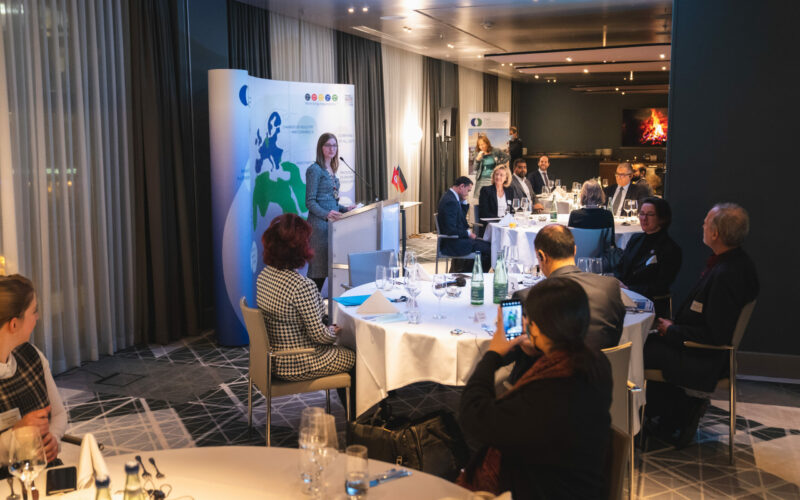
An intensive week of networking, workshops, and project development climaxed on December 9 with the exclusive networking event “Digital Transformation of the Tunisian Economy” under 2G+ conditions at the Marriott Hotel in Berlin. The Tunisian guests of the EMA partner association Club DSI Tunisia had the opportunity to exchange ideas with high-ranking representatives from politics and the digital economy as well as strategic experts. In the direct talks, they engaged in discussions about developments and opportunities for future cooperation.
Among others, Club DSI representatives Ahmed Cherif and Haithem Abdelkefi were present. Mr. Cherif is President of Club DSI and Director at the Tunisian Electricity and Gas Company (STEG). Mr. Abdelkefi is Secretary General of Club DSI and Head of the IT Department of ABC Bank Tunisia. They presented their association and its relevance for the digitalization of the economy to the participants. The presentation of the Forum DSI, the association’s main annual event, was particularly impressive. EMA Secretary General Clara Gruitrooy was among the international guests in Tunis at the end of October.
Covid-19 as an “accelerator of digital transformation”
For the Tunisian Embassy, Minister Plenipotentiary and Head of Political Affairs Lachraf Ben Krayem attended the event. He thanked the EMA for continuing to organize seminars and matchmaking events between Tunisia and Germany, leading to “win-win partnerships”.
“The unprecedented ‘big bang’ caused by Covid-19 has played a role as an accelerator of digital transformation, which has thus become an absolute necessity, without which the industrial structures and economic models already affected by the crisis caused by the pandemic would not be able to ensure their resilience and even their sustainability,” Ben Krayem stressed, highlighting the importance of the topic.
Digitally compatible economic and business models for the post-Covid-19 era
Goals, action plans, and partnerships like the one between EMA and Club DSI are indispensable to implement new digitally compatible economic and business models for the post-Covid 19 era. In any case, Tunisia stands ready as a hub with potential in terms of both digitalization and renewable energies to enable and help shape the expected transformation.
EMA: “Good minds for valuable projects”
In her contribution, software entrepreneur and former EMA board member Viola Klein outlined the beginnings of the PartnerAfrica project Cross-Sector Digitalization in Tunisia, in the context of which the event took place. It goes back to the German-Arab Digital Forum, which the EMA hosted for the first time in 2017 as part of CEBIT, then the world’s leading trade fair for the IT sector. “At the EMA, when you put good minds together, valuable projects always come out,” Klein applauded.
Women lead the digital transformation in Tunisia
She cited as an example the successful and award-winning German-Arab mentoring program Ouissal, which the EMA launched in 2012. During her participation as a mentor, Mrs. Klein got to know women-led start-ups from Morocco and Tunisia, which illustrate the great potential of young women for the digitalization of the economy in North Africa.
In his keynote speech, former German Ambassador to Tunisia Dr. Andreas Reinicke, Senior Advisor for Digital Cooperation with North Africa at the German Ministry for Economic Cooperation and Development (BMZ), also pointed out that the IT sector in Tunisia is largely shaped by women, who make up the majority of students in STEM subjects.
PartnerAfrica project between EMA and Club DSI
Club DSI is a network association of Chief Information Officers (CIOs) in Tunisian public and private companies. It provides its members with the framework to develop their professional contacts, promote exchanges and synergies among themselves and with foreign countries, and encourage the development of innovations, best practices, and new services.
In this PartnerAfrica project, the EMA is supported by sequa gGmbH within the framework of the BMZ Special Initiative on Training and Employment. Under the brand “Invest for Jobs”, the special initiative has bundled a range of offers to support German, European, and African companies in their employment-generating engagement in Africa.
